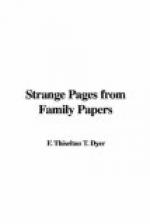A strange and romantic story is told of Blenkinsopp Castle, which, too, has long been haunted by a “white lady.” It seems that its owner, Bryan de Blenkinsopp, despite many good qualities, had an inordinate love of wealth which ultimately wrecked his fortune. At the marriage feast of a brother warrior with a lady of high rank and fortune, the health was drunk of Bryan de Blenkinsopp and his “lady love.” But to the surprise of all present Bryan made a vow that “never shall that be until I meet with a lady possessed of a chest of gold heavier than ten of my strongest men can carry into my Castle.” Soon afterwards he went abroad, and after an absence of twelve years returned, not only with a wife, but possessed of a box of gold that took three of the strongest men to convey it to the Castle. A grand banquet was given in honour of his return, and, after several days feasting and rejoicing, vague rumours were spread of dissensions between the lord and his lady. One day the young husband disappeared, and never returned to Blenkinsopp, nothing more being heard of him. But the traditionary account of this mystery asserts that his young wife, filled with remorse at her undutiful conduct towards him, cannot rest in her grave, but must wander about the old castle, and mourn over the chest of gold—the cursed cause of all their misery—of which it is supposed she, with the assistance of others, had deprived her husband. It is generally admitted that the cause of Bryan de Blenkinsopp’s future unhappiness was the rash vow he uttered at that fatal banquet.
Associated with this curious romance there are current in the neighbourhood many tales of a more or less legendary character, but there has long been a firm belief that treasure lies buried beneath the crumbling ruins. According to one story given in Richardson’s “Table Book of Traditions” some years ago, two of the more habitable apartments of Blenkinsopp Castle were utilized by a labourer of the estate and his family. But one night, the parents were aroused by screams from the adjoining room, and rushing in they found their little son sitting up in bed, terribly frightened. “What was the matter?”
“The White Lady! The White Lady!” cried the boy.
“What lady,” asked the bewildered parents; “there is no lady here!”
“She is gone,” replied the boy, “and she looked so angry because I would not go with her. She was a fine lady—and she sat down on my bedside and wrung her hands and cried sore; then she kissed me and asked me to go with her, and she would make me a rich man, as she had buried a large box of gold, many hundred years since, down in a vault, and she would give it me, as she could not rest so long as it was there. When I told her I durst not go, she said she would carry me, and was lifting me up when I cried out and frightened her away.” When the boy grew up he invariably persisted in the truth of his statement, and at forty years of age could recall the scene so vividly as “to make him shudder, as if still he felt her cold lips press his cheeks and the death-like embrace of her wan arms.”




